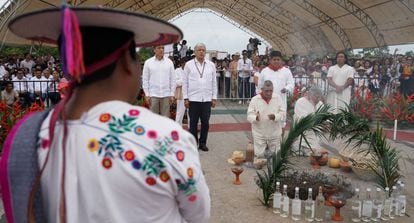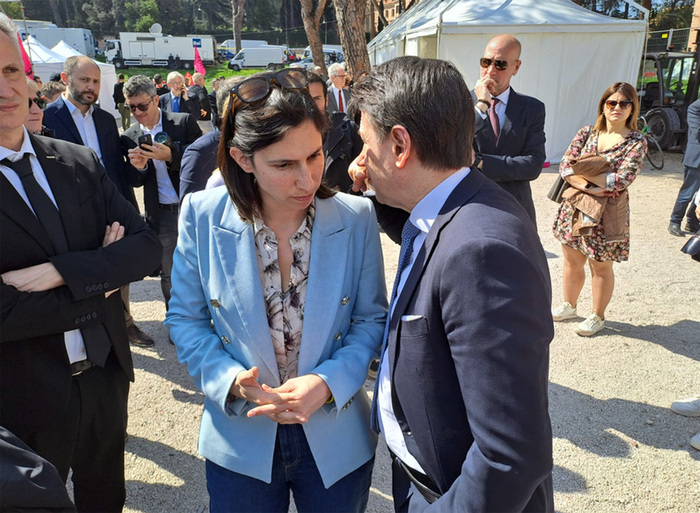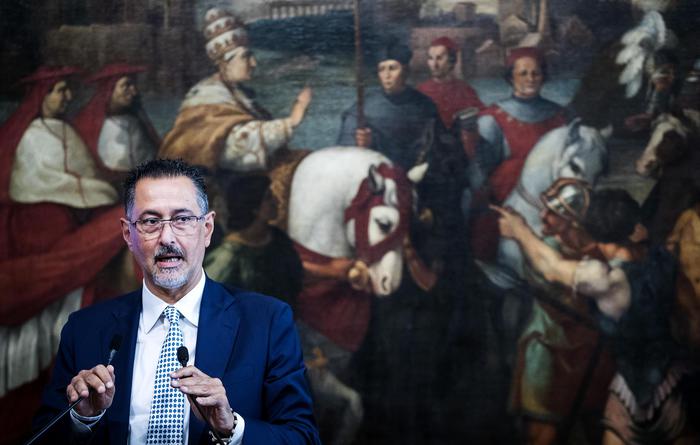Andrés Manuel López Obrador, during the inauguration of the Mayan Train, in December 2018 in Palenque.
Who can ask for forgiveness and who can grant it? These questions that the Zapatista Army of National Liberation launched in 1994 now resonate again, with validity, but in different circumstances. On Monday, May 3, Andrés Manuel López Obrador, led a ceremony to apologize to the Mayan people for all the atrocities committed by individuals, national and foreign authorities, during the three centuries of colonialism and in the two centuries of independent Mexico. The president listed a list of grievances, citing newspapers and characters that helped justify a narrative in which, in the name of progress, the indigenous population in general and the Mayan population in particular should disappear. Specifically, he apologized to those who were victims of the repression by the so-called "Caste War", an uprising that began in 1847,that lasted more than 50 years and that was drowned by the brutal repression of the Porfirian government. The so-called "Caste War" was a complex phenomenon whose name has even been widely disputed by Mayan historians. After listening to his words, we can realize that the president not only apologized for the Mexican State, but even mentioned what happened during the centuries of rule of the Spanish crown in these lands.but he even mentioned what happened during the centuries of rule of the Spanish crown in these lands.but he even mentioned what happened during the centuries of rule of the Spanish crown in these lands.
Much influenced by the Judeo-Christian tradition, forgiveness is something that is associated with guilt. In another field of meanings and in other cultures, we find the recognition of responsibility and the offer to compensate, as far as possible, the damages caused. While the request for forgiveness has been filled with a sense in which the protagonist becomes the one who needs to be forgiven to free him from guilt, the recognition of damage, compensation and the promise of non-repetition are focused on who has suffered. the grievances. Away from a possible religious reading, the recognition of the damage caused does not address the urgency of alleviating the remorse of those who ask for forgiveness, but rather the complex reflection of the circumstances that led to this affront and violence.
In this sense, it seems important to me to acknowledge the terrible acts that have been committed against various peoples and populations throughout history, even though a long time has passed and those directly responsible no longer exist. Naming the horrors is necessary to illuminate a path that leads to a commitment to non-repetition. Words become facts when they signify the first necessary step to speak about what was shrouded in complicit silence and that I try to erase to prevent justice. For example, naming a massacre that was carried out in a place acquires a genuine power when that naming implies making evident what the silence has erased, thus maintaining the violence that originated it in force. Forgiveness is punctual, while recognition is the result of a complex process, it is to know again,It is the end point of a period of reflection in which multiple voices are heard and in which it is tried to understand what happened, why these unfortunate events were reached, how the damage can be compensated as far as possible and how it can be avoid repetition. In different cultures, recognition is always the product of a collective process in which different actors assume different degrees of responsibility: if there is a murderer, in addition to punishing him, the community itself enters a period of reflection to detect if there is something in its operation that led to the existence of violence of that degree. Recognition is essential and is a necessary step to do justice.why these unfortunate events were arrived at, how the damage can be compensated as far as possible and how its repetition can be avoided. In different cultures, recognition is always the product of a collective process in which different actors assume different degrees of responsibility: if there is a murderer, in addition to punishing him, the community itself enters a period of reflection to detect if there is something in its operation that led to the existence of violence of that degree. Recognition is essential and is a necessary step to do justice.why these unfortunate events were arrived at, how the damage can be compensated as far as possible and how its repetition can be avoided. In different cultures, recognition is always the product of a collective process in which different actors assume different degrees of responsibility: if there is a murderer, in addition to punishing him, the community itself enters a period of reflection to detect if there is something in its operation that led to the existence of violence of that degree. Recognition is essential and is a necessary step to do justice.In addition to sanctioning it, the community itself enters a period of reflection to detect if there is something in its operation that led to the existence of violence of that degree. Recognition is essential and is a necessary step to do justice.In addition to sanctioning it, the community itself enters a period of reflection to detect if there is something in its operation that led to the existence of violence of that degree. Recognition is essential and is a necessary step to do justice.
The ceremony led by the president of the republic is far from being the culmination of a process in which various voices of the Mayan people have been heard, far from being the result of a detailed and necessary memory exercise of the complex society that inhabits the peninsula, it is far from being the ritual that crystallizes the reflection that the non-indigenous population, heir to the Creole privileges of those who repressed the Mayans in the 19th century. The forgiveness ceremony led by the president does not rethink the relationships that currently reproduce racism against the Mayan population or rethink the ideas of progress that are also wielded today to justify projects such as the Mayan Train that is not Mayan.
The forgiveness ceremony was not the establishment of a new relationship between the state and the Mayan people. Just as in the name of progress the Mexican State determined what was the best way to solve “the indigenous problem” in past times, so today the State decides that the Mayan Train, the interoceanic project or the Morelos comprehensive plan are the unilateral responses to the situation that the State itself has created for indigenous peoples in the past. It was not the Mayan people, after an intense struggle, who proposed the construction of a train run by the military to alleviate their problems, it was not the indigenous communities that inhabit that wonderful strip of land between the Gulf and the Pacific. who requested an interoceanic project managed by the Navy,It was not the Nahua populations who clamored for a thermoelectric plant in their territories. We know the genealogy of these projects, which is a genealogy linked to other interests, even though they are wrapped in the banner of progress for indigenous peoples, that same idea of progress that the president mentioned as the justification for the oppressions of the 19th century. The president pointed out that, thanks to the multiple social programs that he was unable to detail due to the electoral ban, the Mayan population is in a different situation now. Is that the compensation for the damages that it raises?that same idea of progress that the president mentioned as the justification for the oppressions of the 19th century. The president pointed out that, thanks to the multiple social programs that he was unable to detail due to the electoral ban, the Mayan population is in a different situation now. Is that the compensation for the damages that it raises?that same idea of progress that the president mentioned as the justification for the oppressions of the 19th century. The president pointed out that, thanks to the multiple social programs that he was unable to detail due to the electoral ban, the Mayan population is in a different situation now. Is that the compensation for the damages that it raises?
What does the head of the Mexican state gain from this ceremony? Perhaps one of the things that he gains is an apparent legitimacy to be, on the one hand, the one who asks for forgiveness and thus also be able to grant it: he asks for forgiveness so that he can also demand it from the Spanish Government on behalf of the indigenous peoples. Who can ask for forgiveness and who can grant it? Who wants to supplant the voice, the multiple, complex and contradictory voices that come from the indigenous peoples, overlapping voices like those who protested outside while the president gave his speech alongside characters like the governor of Quintana Roo. Those voices, those shouts, crept in in the middle of the official ceremony and recall all the protests derived from the implementation of the Mayan Train and the many problems faced by the indigenous population in the peninsula. Sorry president,As long as the Mexican State imposes projects with the banner of progress as it has always been done, you cannot ask for forgiveness and you cannot grant it, or even request it, on behalf of the indigenous peoples. Sorry, President, but we do not need forgiveness, but recognition, redress and no repetition. A radical change, then.
Subscribe here
to the
newsletter
of EL PAÍS México and receive all the informative keys of the current situation of this country









